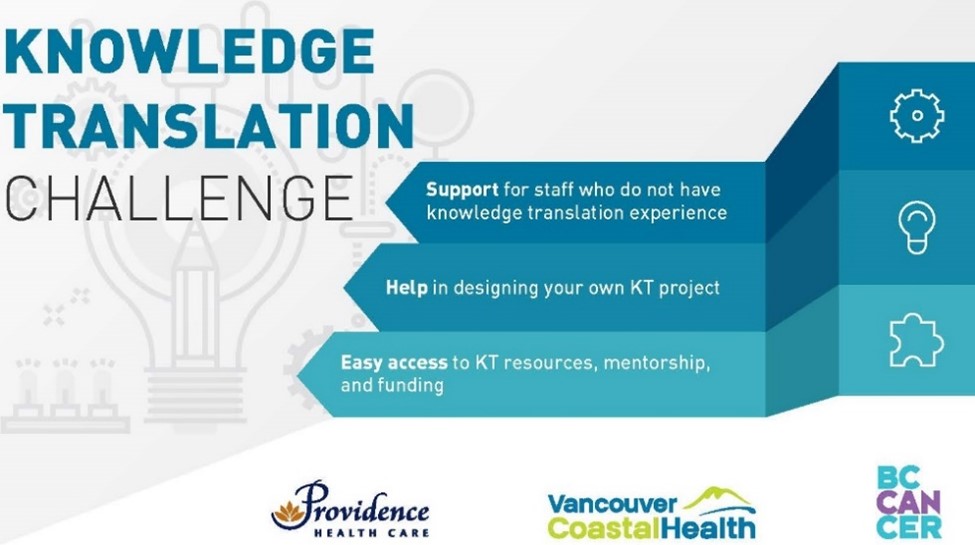Congratulations to our BC Cancer team and the Providence Health Care and Vancouver Coastal Health Research Institute teams for their successful funding awards!

About the KT Challenge
The Knowledge Translation (KT) Challenge is an annual program run in collaboration with Providence Health Care (PHC), Vancouver Coastal Health Research Institute (VCHRI) and BC Cancer. Using a comprehensive approach that combines training mentoring and funding, this program helps clinicians build skills and confidence to identify, implement, and evaluate evidence-informed practice improvements.
KT Challenge 2024 team recipients
Integrating Caregivers into care teams for Autologous Multiple Myeloma Outpatient Transplants in the Leukemia/Bone Marrow Transplant Program of BC
Team members: Laura Brace, Nikki Stiver
Care Supporter Patient Partner: Margeaux Muir
Laura, a registered nurse, and Nikki, a registered social worker, will be starting their KT Challenge project this year. As the team lead, Laura generously shared her motivations and insights for joining the KT Challenge program:
“It is well known that knowledge translation is one of the ways we move healthcare into the future. Knowing this, when I saw the KTC Challenge in my email inbox, I recognized an opportunity to make an impact for our patient population using established research and exploring new ideas for oncology care models."
“The Leukemia/BMT program already provides excellent and state of the art care for all of our patients, it is truly a very dynamic program. Within some of our treatment plans, we rely heavily on care support from family members and as care is often long term and can continue for years beyond a standard hospital stay. In addition, many specific treatments have shifted entirely to outpatient care as the research and evidence proves these to be safe, cost effective and improve the wait times for treatments."
“Autologous stem cell transplants for Multiple Myeloma, over the years, have shifted to such an outpatient model that operates out of the L/BMT outpatient department at VGH. This has both proven to be a successful way to provide care and been excellent at improving access to care across the program. Patients come to the outpatient L/BMT daycare unit for care and are then released into the care of their care supporters (also known as care givers) for care between visits.
“An autologous transplant is a complex procedure that can place significant stress on these care supporters as they embark on the new treatment pathway. Through interviews with care providers and former patients, I identified a level of distress amongst these care providers that has not been highlighted or considered as of yet within the current care model."
“Research identifies that this distress can stem from lack of education and support for the care providers and therefore, challenges in caring for their family member, affecting care outcomes for the patients and potentially increasing hospitalizations for this population. A gap in knowledge was identified (through interviews) specifically in symptom management, outpatient care needs, and what defines an emergency scenario."
“Research supports education programs and a shift to include them in the care team. Care supporter distress has been shown to ease through integrating the care supporter into the care team through acknowledging their input, supporting their needs and providing education in their role as carer."
“My small but mighty team of 2 and our care supporter patient partner have embarked on moving this research into practice through developing and providing education resources to this group as well as moving towards integrating the care support person/ people into the care team. We hope to identify and develop ways to streamline symptom assessment, symptom management, and develop a system of charting for the caregiver to acknowledge and support their contributions to care (through CST charting by the nurse of care happening in the home). We are excited to see this come to action and hope it serves to improve the already excellent care in the BMT program!"
Thinking about implementing a practice change?
Consider joining the 2025 KT Challenge! More information will be coming soon on how to apply.
Visit the Nursing and Allied Health Research & KT department website to learn more about the KT Challenge and read more about ongoing projects.